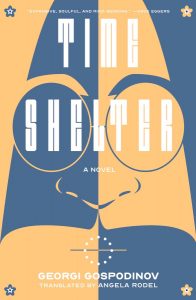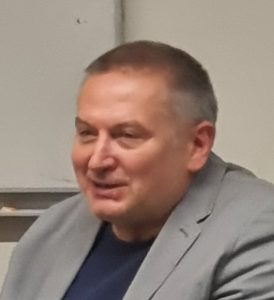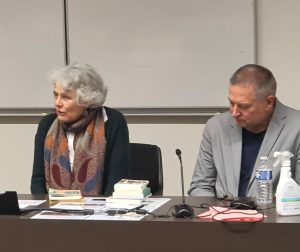Georgi Gospodinov is an internationally acclaimed Bulgarian writer and poet and the author of the acclaimed Time Shelter (Bulgarian: Времеубежище; English translation by Angela Rodel; French translation by Marie Vrinat-Nikolov). In May 2023, his novel won the International Booker Prize, the prestigious British award for the best book translated into English. This award not only helped to raise G. Gospodinov’s international profile but also underlined the importance of the translation process, with the prize going to the author and his translator, Angela Rodel.
 Time Shelter plunges us into the world of a “clinic of the past” for Alzheimer’s patients. Each floor of the establishment offers a journey into the past for those who have lost their memory. This brilliant novel, full of irony and melancholy, tackles an essential contemporary question: what happens when we lose our memories? The book explores our relationship with the future through a captivating plot.
Time Shelter plunges us into the world of a “clinic of the past” for Alzheimer’s patients. Each floor of the establishment offers a journey into the past for those who have lost their memory. This brilliant novel, full of irony and melancholy, tackles an essential contemporary question: what happens when we lose our memories? The book explores our relationship with the future through a captivating plot.
G. Gospodinov is one of the leading writers of contemporary European literature and is sometimes referred to by the media as the “Proust of the East.” He is the most widely translated Bulgarian writer, with his works available in 25 languages. His success and impact beyond Bulgaria’s borders highlight the richness of the Bulgarian literary scene, which boasts a robust poetic tradition.
In this exclusive interview with Regard sur l’Est, G. Gospodinov shares his thoughts on writing, the place of Bulgarian writers in their country, their difficulties, and his precious relationship with his translators. His work explores memory, history, and identity; his voice reaches beyond national borders to readers worldwide.
Regard sur l'Est: How and why did you start writing?
Georgi Gospodinov: I started writing with an unseemly precociousness. I was about seven years old. The reasons were fear and loneliness. The first thing I wrote was a horrible dream, a nightmare that repeated itself night after night. I noticed that I never dreamt it again after I wrote it down. Today, 48 years later, I might add that I’ve never forgotten it either. That’s the price of writing; it saves you from nightmares but also creates the memory of them.
What place and attention is given to Bulgarian writers in your country?
Bulgarian writers have always played a key role in Bulgarian history, and, as a rule, their lives have been somewhat tragic. Most of them died young or committed suicide, which was particularly noticeable at the beginning of the 20th century. But if you ask what place the State gives to Bulgarian writers, it is very modest and unenviable. The state does not like to read very much. But we have an excellent public holiday dedicated to Slavo-Bulgarian writing to the Cyrillic alphabet - 24 May, a day loved by generations of Bulgarians. As it happens, I was awarded the Booker International Prize in London on the eve of this public holiday. I’ll never forget the joy and excitement of Bulgarian readers for several days. A community that celebrates literature and can come together around a book seems to have a future.
What difficulties do you encounter in Bulgaria?
It’s not easy to be a Bulgarian writer abroad. But it’s not easy either, and perhaps even more challenging, to be a Bulgarian writer in Bulgaria. Few Bulgarian writers can make a living from their writing alone. Circulation figures are generally low. The political situation is such that it does not allow writers to immerse themselves calmly in their writings, especially if they have a recognized position. As everywhere, the amount of hatred on the networks is too significant. But literature requires something else: slow time and concentration, both on the part of the writer and the reader. But it’s not just in Bulgaria that this is difficult. In the face of what is happening in the world and today’s wars, we have no right to complain.

What does the Bulgarian literary scene look like?
The Bulgarian literary scene is colorful and lively and goes in many directions. Traditionally, we have compelling poetry; I think it’s even the most vital historical genre in our literature. To that, I would add a narrative. This is probably linked to the rich oral culture of the last two centuries. One of the best storytellers and short story writers is Yordan Raditchkov, published in French a few years ago.
How does being an internationally acclaimed author feel, especially in France?
I am delighted that my very first novel, Natural Novel. (Bulgarian: Естествен роман, English translation by Zornitza Hristova, French translation by Marie Vrinat-Nikolov), was noticed and appreciated by French critics. I remember some solid reviews for The Physics of Sorrow, including one from the famous philosopher Jean-Luc Nancy. My new novel, Time Shelter, published by Weidenfeld & Nicolson, is also attracting interest, especially since winning the International Booker Prize. I’m lucky to have an excellent English and French translator, Angela Rodel and Marie Vrinat-Nikolov. But I don’t think my books have had much success in France, or at least not the same success as in other countries.
My translators are the best readers I’ve ever had. I’m friends with most of them. That’s the case with my English and French translators and those who translate into Italian, Danish, German, Spanish, Polish, etc. I also enjoy constantly conversing with the translator, helping him if possible. We continuously exchange letters with questions and comments about the translation. I trust translators who have questions.

Georgi Gospodinov and Marie Vrinat-Nikolov (INALCO, Paris, 25/11/2021)
Which book are you most proud of, and why?
Each book has been a source of emotion, and I have left a part of myself in it. Natural Novel, the first novel I wrote, was extraordinary. Time Shelter brought me the most joy and recognition. I consider The Physics of Sorrow one of my most important books. My favorite genre is the short story. I have three books of short stories, some of which have been translated into English and are out of print [and reissued in paperback]. I hope to do a volume of short stories from different books for English readers one day. There is a return to the short story and essay genres. The essay is the natural genre for the crisis period in which we live.
Which book took the most effort? Why or why not?
The one that took me the longest to write was The Physics of Sorrow. Perhaps because it attempts to tell and combine a family story spanning the whole of the twentieth century and a history of grief from the Minotaur to the present day, books of this kind are not easy to write.
What are your plans for the future?
I’m getting ready to write a novel. I need to find the time and a refuge. Otherwise, I keep thinking about what’s happening in the world, writing essays, and one day, I’ll have to find the time to put them all together in a book.
Translation from Bulgarian: Assen Slim.
* Assen Slim is a professor of Economics at the Institut national des langues et civilisations orientales – INALCO (Blog).
Link to the French version of the article
Link to the Bulgarian version of the article
To quote this article: Assen SLIM (2024), “The Writing that Saves: Interview with Georgi Gospodinov, winner of the 2023 International Booker Prize,” Regard sur l’Est, March 4th.
